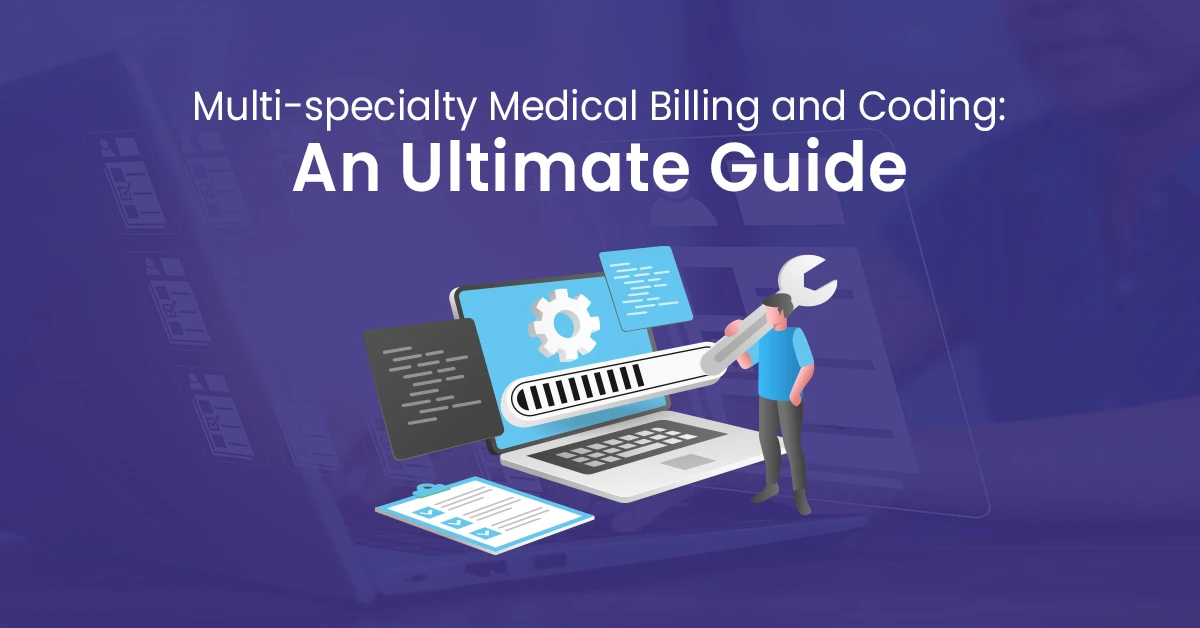Running a clinic with different kinds of doctors can be tricky, especially when sorting out the bills.
Medical codes and rules are always changing, so it’s easy to get confused. But if you pay attention to your billing, you can ensure you get the money you’re owed. Also, billing for clinics with many types of doctors differs from billing with just one type of doctor.
Multiple-Specialty Clinics and Billing
In a hospital where doctors of different specialties work together, a patient might have appointments with specialists on the same day, like a general doctor and a heart doctor. Both doctors provide checkups and other services.
How can we make sure both doctors get paid for their services?
Fortunately, there’s a solution that can alleviate the burden of billing complexities in multi-specialty clinics. Outsourcing your billing to a trusted third-party US medical billing company can help you get the maximum reimbursement, as they are expert in handling difficulties in Handling Medical Billing for Multiple Specialties.
Billing for medical services from different specialties can be complicated. Multi-specialty practices face their own set of challenges.
Here are some of the issues they deal with:
Many Different Billing Codes
When dealing with multiple specialties, there are many billing codes to keep track of. Each medical specialty has its own set of codes for billing and procedures. For example, the codes used by an orthopedic surgeon will differ from those used by a cardiologist.
So, it can be tough to keep track of all these different codes and use them correctly.
Newbie billing companies or staff in the office
One big problem for specialty clinics is when they work with billing companies or staff who need more experience. Billing for specialty medical services needs a good understanding of the special codes and rules for each type of specialty. Newbie billers might need to learn how to code and bill for these specialized services correctly, which can cause mistakes, lose money, and upset patients. Specialty clinics must collaborate with experienced billing pros who know their specialty well. That way, they can ensure the billing is done right and follows all the rules.
More Chances of Errors
Because bills are big and have many different codes and rules from insurance companies, multi-specialty practices are more likely to make mistakes. Even small errors when typing in codes or insurance info can mean getting less money or rejecting claims. This can mess up how much money your practice makes.
Handling Patient Expectations
Many patients visit clinics that offer various services in one place. They often want to receive just one bill for all the services they have instead of separate bills for each service. Meeting these expectations while organizing charges correctly across different departments is quite a challenge.
Following Rules for Multiple Medical Fields
Each type of medical job needs to follow different rules from both the state and federal governments. This gets trickier when dealing with medical records. Ensuring everything follows the rules for different medical areas when there are many specialties adds more difficulties to billing.
But handling billing for many medical areas can be managed if you:
- Plan well
- Train properly
- Use technology wisely
Practical Approaches to resolve Billing issues in Multi-specialty medical billing
While the challenges above can be intimidating, they are not impossible. Below are some practical strategies for streamlining your multiple specialty medical billing:
1. Investing in a Billing Software
Dedicated medical billing software can handle the complexities of multi-specialty practices and their billing processes, minimizing manual errors. The software stays up-to-date with the latest billing and coding advancements, ensuring accuracy and compliance.
Below is a complete rundown of the top 5 medical billing software:
2. Consistent Training and Education
Billing staff need ongoing and consistent education and training. Familiarizing themselves with the nuances of varying specialties and payer rules can help dramatically reduce errors and improve reimbursement rates.
3. Outsourcing Medical Billing Service
Another workable solution is outsourcing medical billing operations to a professional third-party provider. Such services and experts are specialists in handling the complexities of billing multi-specialty practices. Furthermore, by outsourcing billing operations, your staff can focus more on patient care.
4. Structure Regular Audits
Equally important are regular audits of your billing processes. Doing so can catch billing and coding errors before they lead to claims denials. Medical billing audits additionally provide opportunities for assessing and improving your practice billing efficiencies.
Conclusion
Handling medical billing for different types of doctors can be challenging. It’s also challenging to understand all the different billing codes and rules from insurance companies, especially for medical areas. However, healthcare practices can streamline the billing process by investing in medical billing software, conducting regular medical billing programs, and outsourcing the billing side to third-party medical billing companies.
FAQs
What are the main kinds of medical billing?
There are two main types: professional billing and institutional billing. If you’re thinking about starting a career in medical billing and coding, it’s important to understand these two types.
What’s the top medical coding specialty?
Diagnostic Coding: This specialty involves coding diagnoses based on patient’s symptoms, test results, and doctors’ statements. To do well in this area, you must know a lot about medical terminology, different diseases, and how to code correctly.


